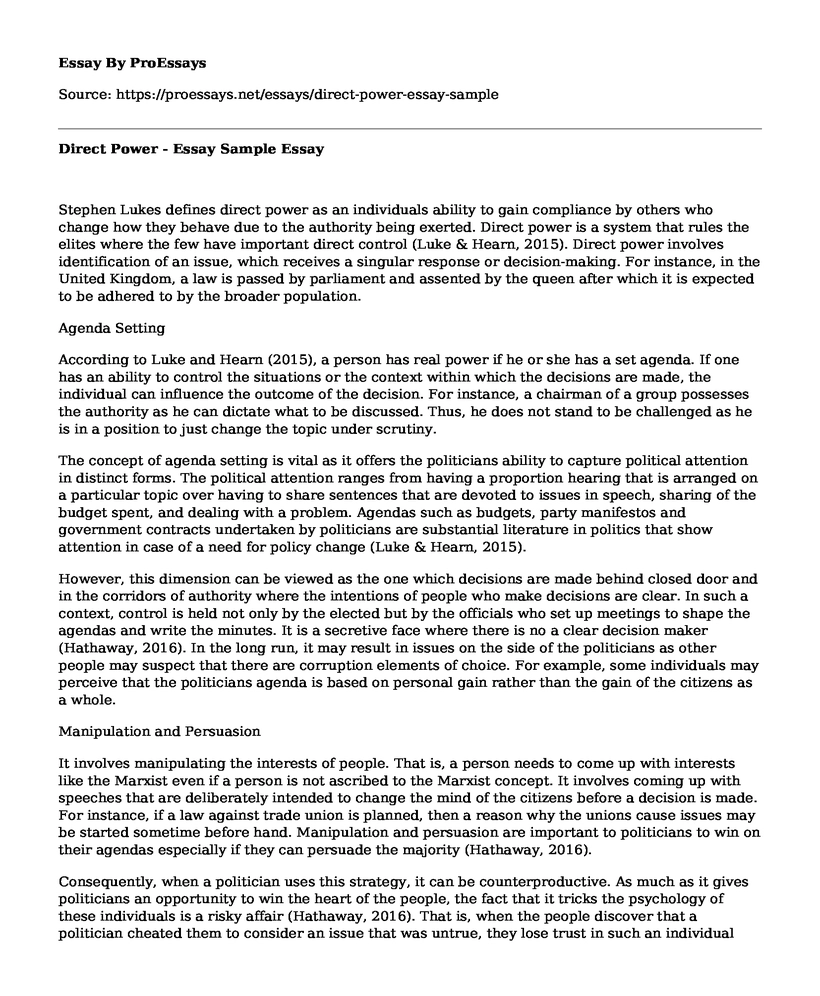Stephen Lukes defines direct power as an individuals ability to gain compliance by others who change how they behave due to the authority being exerted. Direct power is a system that rules the elites where the few have important direct control (Luke & Hearn, 2015). Direct power involves identification of an issue, which receives a singular response or decision-making. For instance, in the United Kingdom, a law is passed by parliament and assented by the queen after which it is expected to be adhered to by the broader population.
Agenda Setting
According to Luke and Hearn (2015), a person has real power if he or she has a set agenda. If one has an ability to control the situations or the context within which the decisions are made, the individual can influence the outcome of the decision. For instance, a chairman of a group possesses the authority as he can dictate what to be discussed. Thus, he does not stand to be challenged as he is in a position to just change the topic under scrutiny.
The concept of agenda setting is vital as it offers the politicians ability to capture political attention in distinct forms. The political attention ranges from having a proportion hearing that is arranged on a particular topic over having to share sentences that are devoted to issues in speech, sharing of the budget spent, and dealing with a problem. Agendas such as budgets, party manifestos and government contracts undertaken by politicians are substantial literature in politics that show attention in case of a need for policy change (Luke & Hearn, 2015).
However, this dimension can be viewed as the one which decisions are made behind closed door and in the corridors of authority where the intentions of people who make decisions are clear. In such a context, control is held not only by the elected but by the officials who set up meetings to shape the agendas and write the minutes. It is a secretive face where there is no a clear decision maker (Hathaway, 2016). In the long run, it may result in issues on the side of the politicians as other people may suspect that there are corruption elements of choice. For example, some individuals may perceive that the politicians agenda is based on personal gain rather than the gain of the citizens as a whole.
Manipulation and Persuasion
It involves manipulating the interests of people. That is, a person needs to come up with interests like the Marxist even if a person is not ascribed to the Marxist concept. It involves coming up with speeches that are deliberately intended to change the mind of the citizens before a decision is made. For instance, if a law against trade union is planned, then a reason why the unions cause issues may be started sometime before hand. Manipulation and persuasion are important to politicians to win on their agendas especially if they can persuade the majority (Hathaway, 2016).
Consequently, when a politician uses this strategy, it can be counterproductive. As much as it gives politicians an opportunity to win the heart of the people, the fact that it tricks the psychology of these individuals is a risky affair (Hathaway, 2016). That is, when the people discover that a politician cheated them to consider an issue that was untrue, they lose trust in such an individual and indirect betrayal effects follow (Hathaway, 2016). For instance, in the United Kingdom, economists hence have manipulated the working class conception of their interest; they perceive capitalism is for their interest rather than socialism. Issues like education; health such as the Universal coverage has made the wealthy believe that capitalism is everything. However, the individuals fail to understand that the wealthy hardly get time to enjoy the privileges offered by capitalism to them. When such people become aware of the deceit provided by capitalism, they may come up with ways to protect themselves from the effect of the deception such as impeachment of the politicians involved (Hathaway, 2016).
References
Hathaway, T. (2016). Lukes reloaded: an actor-centred three-dimensional power framework. Politics, 36(2), 118-130.
Lukes, S., & Hearn, J. (2016). Power and Economics. In Who Runs the Economy? (pp. 17-29). Palgrave Macmillan UK.
Cite this page
Direct Power - Essay Sample. (2021, Jul 17). Retrieved from https://proessays.net/essays/direct-power-essay-sample
If you are the original author of this essay and no longer wish to have it published on the ProEssays website, please click below to request its removal:
- Essay Sample on Challenges of Generational Employees
- Vroom-Yetton Decision Model - Essay Sample
- Power and the Image of Nursing Essay Example
- Essay Sample on Decision Models: A Guide to Help You Make the Right Choice
- Research Paper on Inclusive Development: Key Indicators & Reasons for Promotion
- Essay Sample on Co-Opetition: Achieving Mutual Benefit Through Supply Networks
- Leadership Styles of Sheikh Zayed & Sir Richard Branson - Essay Sample







